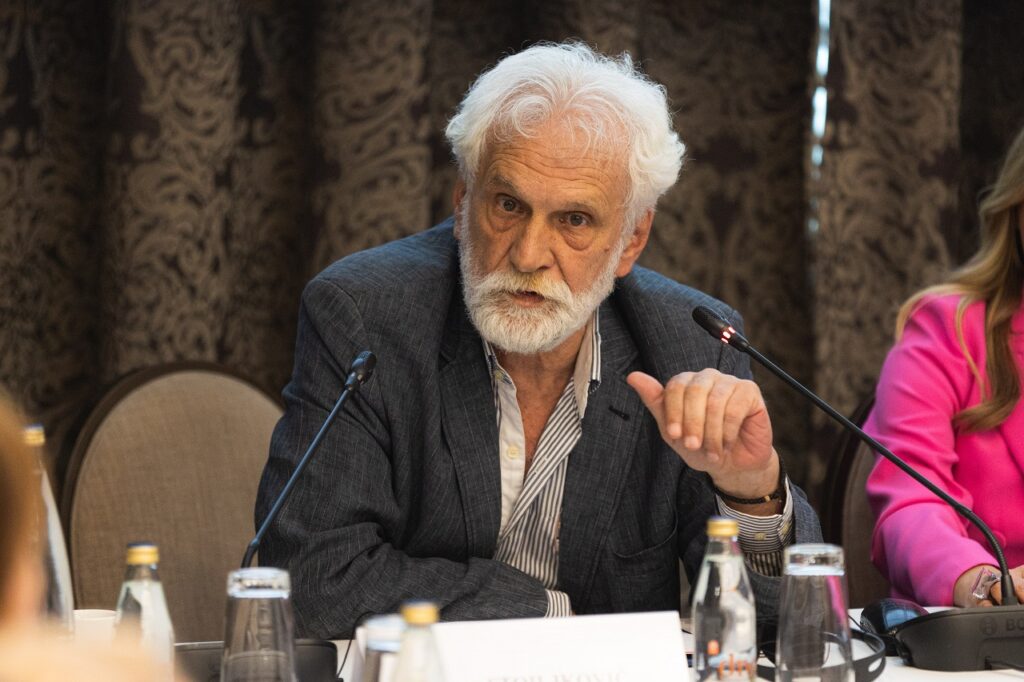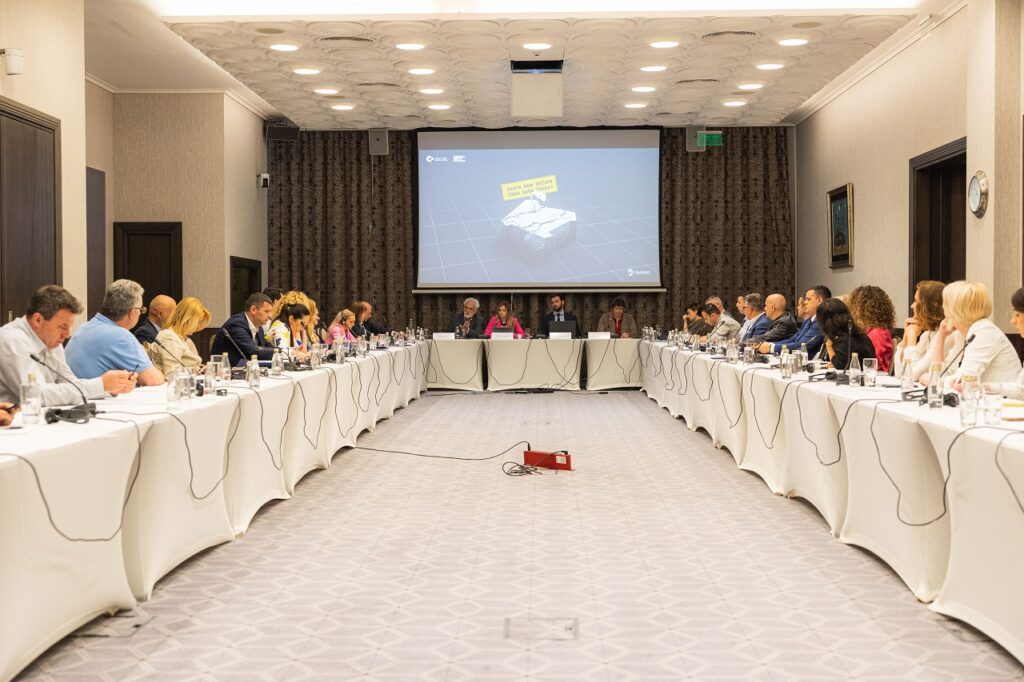At the level of a political formula – a set of desirable values and the accompanying institutional framework that ensures them, and through which the system legitimizes itself, there is a majority consensus among the citizens of Montenegro regarding Montenegro as a European state of rule of law, democracy, social justice and inclusion, and environmentally sustainable development. However, one of the significant burdens is the “unfinished tradition” or re-trationalization of society and divisions, as well as the presence of revisionism and fear of its consequences – as pointed out by some of the findings presented today from the conducted research by the Centre for Civic Education (CCE), Friedrich Ebert Stiftung, and DAMAR Agency at the roundtable discussion “What kind of state of Montenegro do we need?”
Kirsten Schönefeld, the Director of the Regional Office of the Friedrich Ebert Stiftung for Serbia and Montenegro, emphasized the importance of gaining a closer insight into the state of affairs and needs of citizens. “We welcome this very important project that explores the concerns, challenges, and what connects the citizens of Montenegro in light of significant changes in the country. We believe that strengthening inclusive policies oriented toward citizens is crucial for deepening democracy, pluralism, and building trust in institutions and the system. We strongly support Montenegro’s orientation towards the European Union and believe that policies both in the country and in the EU will strive to accelerate the pace of integration processes,” Schönefeld stated.
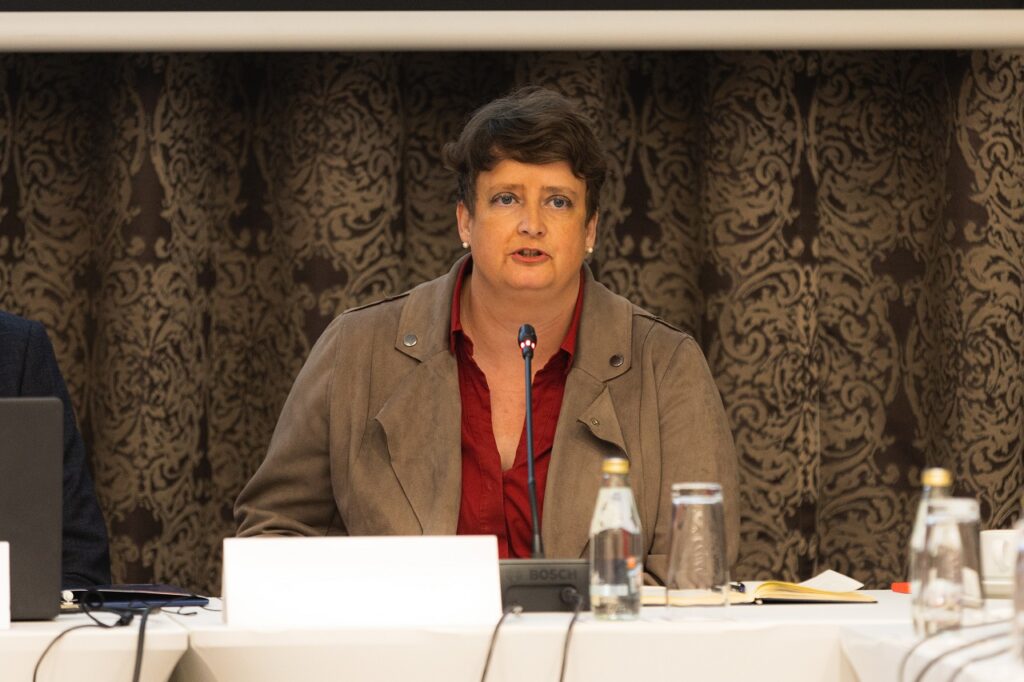
The research covered three main areas: 1) the state and political system, 2) the economic system and policies, and 3) the social system and policies, with 24 coding units included.
Reflecting on the first area, particularly in terms of the organization, division, and control of power, as well as regionalization, decentralization, and local authorities, Daliborka Uljarević, Executive Director of the CCE, pointed out the existing imbalance in certain parts concerning legitimacy and authority. “Opinions are divided on whether the President of the state should have greater authority in exercising power, with a slight majority of 45% believing that his authority should be expanded. It seems that citizens have no illusions that they can influence and control power outside of elections, and they view each existing control mechanism as essentially ineffective, i.e. without any recognition of efficiency for even a fifth of the respondents. The prevailing opinion is that local authorities (mayors, municipal assemblies) in Montenegro should have greater decision-making authority – 51.8%, which also indicates limitations of the centralized system in providing services at the local level. Furthermore, the prevailing opinion is that the Serbian Orthodox Church (SOC) should have the same position as any other religious community because Montenegro is a civic state – 55.3% of respondents are decisive with this view, while less than a third (30.2%) believe that the SOC must have a special status due to the number of believers in Montenegro, and 14.5% cannot determine their stance on this issue,” Uljarević stated.
“Although almost all of our decision-makers swear allegiance to the EU, 46.4% of citizens do not believe that they are working to ensure equality before the law and to have in place European standards that guarantee the rule of law, while the dominant majority (67.9%) consider that the rule of law is not possible without responsibility and equality before the law. It is concerning a small number of those (only 14.4%) who believe that there is a judicial system in Montenegro where they can find justice. However, close to half of the citizenry believe that justice is slow but attainable in Montenegro, with a high number of those who assess that the judicial system works only for the powerful and well-connected (31.6%),” said Uljarević commenting the part of the research related to the rule of law and judicial reform.
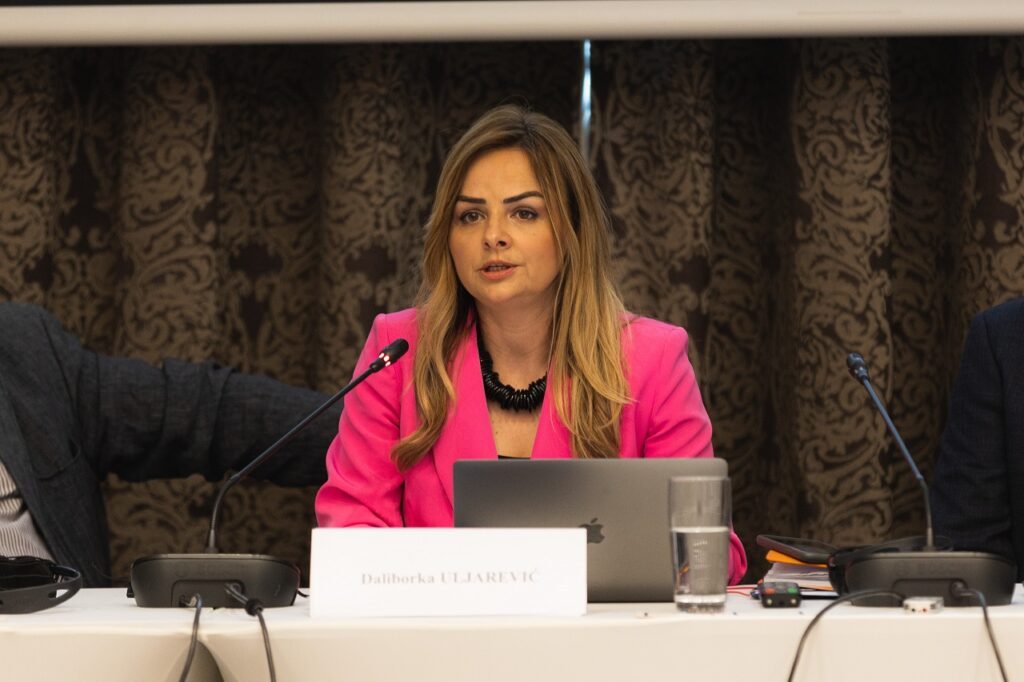
In part of the research that addresses identity issues, the majority of respondents perceive interethnic relations in Montenegro nowadays as good but in need of significant improvement (52.5%), while almost a third (30.6%) consider them to be poor, seeing it as a serious problem. There are divided opinions on the quality of the debate on identity issues, and an equal number of those who believe that scientists and politicians should be engaged in these topics.
“Political parties (53.4%) and religious communities (23.3%) are considered by citizens as the most responsible for divisions in Montenegrin society. Also, slightly over one-third of respondents believe that the secular character of Montenegro is endangered today (34.6%), and there is a concerning number of those who consider that we have rehabilitation of war criminals and movements, as well as historical revisionism in Montenegro (41.1%), which leads to the prevailing opinion that we are facing a problem of radicalization (48.7%). The solutions are seen in a wide range of measures, including legal sanctions, strengthening civic education, educational aspects of the media, etc.,” emphasized Uljarević.
Among various socially harmful phenomena, citizens are primarily concerned about children and their safety, and it is encouraging to see an increasing awareness of the issue of domestic violence. The police are predominantly seen as the institution addressing this problem, and as a result, a sense of security outside of the home prevails (82.9%). There is an imperative stance (close to 80%) that the state urgently needs to review gun permits and reduce the number of weapons in society. When it comes to fighting corruption and organized crime, the Prosecution Office is the most acknowledged actor (31.4%), while all other actors are significantly less recognized.
“Expectedly, considering the support for the EU accession process among the citizenry, the majority believes that the main pillar of Montenegro’s foreign policy should be the EU (58.2%), but the influence of Serbia and Russia is significantly increasing. The prevailing opinion (55%) is that we need new political structures to accelerate the path to the EU, and they see numerous benefits in EU membership,” stated Uljarević.
The majority of citizens believe that Montenegro should maintain its position of recognizing Kosovo and leave Serbia and Kosovo to resolve their relations (46.8%).
“The concerns expressed by citizens in this research highlight the need for improvements in several key areas of governance. By addressing these issues through increased transparency, policy reform, and strategic investments, it is possible to build a more inclusive and efficient government that can be trusted,” said Vuk Čađenović, Executive Director of DAMAR agency.
“There is a divided opinion on the importance of voting in society, where nearly half (47.3%) believe that not participating in voting should be a legitimate way to express dissatisfaction, while a significant number (46.9%) view voting as a civic duty, revealing potential disappointment with the political process among a significant portion of the population. Regarding electoral reforms, there is strong support for the introduction of open electoral lists (62%), indicating the need for increased transparency, and a majority opinion (57.4%) that granting voting rights in diplomatic-consular missions abroad is a good idea also reflects the desire for greater involvement of the diaspora in the political process,” stated Čađenović.
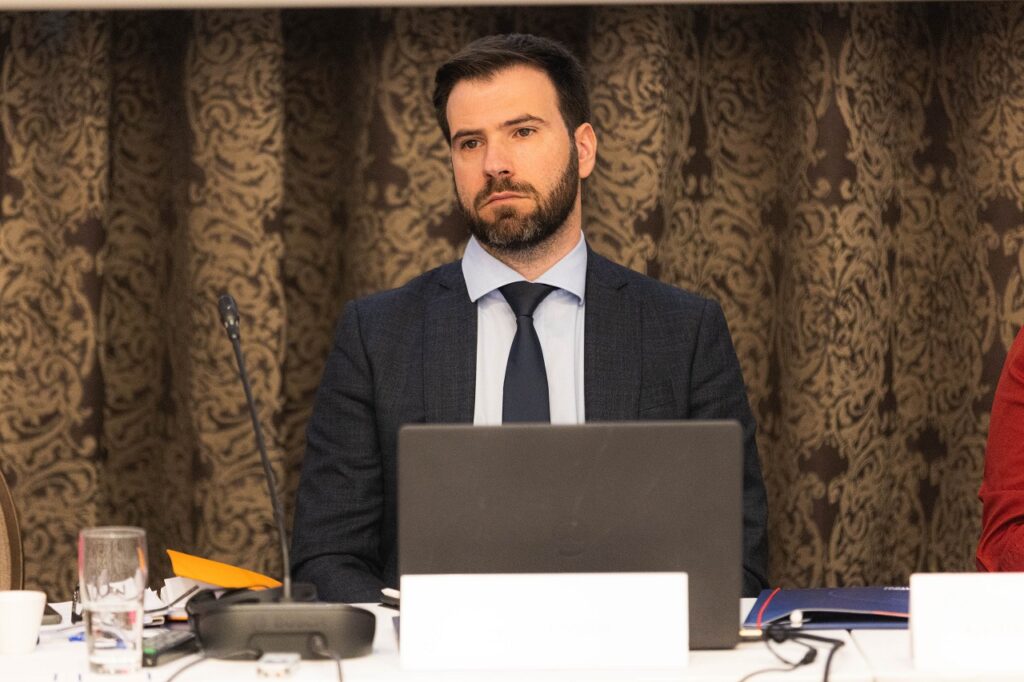
It seems that public trust in political parties is lacking, as 60.3% of respondents believe that political parties do not fulfil their pre-election promises, and the change of government has not convinced the majority that there has been a change in governance and other institutions, as confirmed by the data that 48% consider that the new government also favours its party members, activists, and officials.
“When it comes to the freedom of NGOs to operate and criticize without sanctions, 35.7% believe that NGOs can do so, while almost 50% suggest limitations on free criticism through reactions and insults on social media and comments, or believe that they are not free,” emphasized Čađenović.
Regarding the country’s difficult economic situation, nearly half (49.8%) attribute it to international trends and the impact of the COVID-19 pandemic, while 41.9% blame irresponsible decisions of the government.
“Concerning the trust and transparency regarding tax fairness and taxation, as well as public procurement, the majority of respondents (53.6%) believe that everyone should contribute to taxes, while a significant portion (40.9%) suggests tax exemptions for the poorest and payment based on economic capability, furthermore, 58.9% believe that the law is not equally applied to all taxpayers. In terms of compliance of public procurement with the law, 49.5% of citizens stated that they believe tenders are mostly rigged for those who have connections within these institutions. The high level of mistrust is also indicated by the dominant impression (53.4%) that rationality, professionalism, and depoliticization are not the basis for employment and advancement in public administration,” stated Čađenović.
As development priorities, citizens see healthcare (52.3%), education, science, culture (42.5%), social policy, social entrepreneurship, and employment (34.8%), investments in green energy (37.3%) with the note that there is a considerable number of those who believe that such investments are currently unattainable (33.5%), indicating strong support but also some concerns about feasibility.
Dr Zoran Stoiljković, professor at the Faculty of Political Sciences of the University of Belgrade, commented on the third part of the survey, which focused on the social system and policies. “Considering that this part deals with the political and social pulse of citizens, three recurring data points stand out – first, we need to question how we can live with a grade of 2+ which is repeated even in the majority assessment of how they live and what is the standard, to what extent are changes possible and through the development of the institution of social dialogue and the behaviour of the Government as a partner in it. This grade dominates both in terms of the current situation and expectations. Additionally, it is evident that in Montenegro, the mood fluctuates between hidden, insecure optimism and dissatisfaction and scepticism that one is reluctant to abandon,” said Stoiljković.
He also addressed the influence of tradition on the perception of women’s rights being threatened, as well as the limited work and life prospects for young people highlighted in the research, along with the position of the elderly. “The third aspect I would emphasize is the weight of the context you encounter, which limits the chances for change. Namely, the existing context and resulting limited capacities and resources first lead to a situation where desirable goals, such as reform and development of ecology, energy transition, and improvement of healthcare and educational services and networks, are seen as desirable (by app. one-third) but currently difficult to achieve,” he commented.
In part of education, opinions vary between assessments of primary and secondary education on one side, and higher education on the other. “When it comes to primary and secondary education, a majority would like reforms because these systems are not open to innovation and lack sufficient critical capacity which is supported by the situation that we are used that our children can and must be excellent. The quality of teaching in secondary schools is rated slightly better than the aforementioned 2+ grade, and citizens blame the poor living standard of teachers as well as the low position of institutions educating the teaching staff. Similar views are related to healthcare,” said Stoiljković.
He specifically highlighted the data showing that “over 60% of citizens support the need for people from universities to be present in the public sphere, participating in debates with different perspectives and shaping public policies. However, such individuals are lacking, and too many of them are driven by ego in politics,” he stated.
Finally, he analyzed the data on media, noting that the media situation in the world, including Montenegro, is on a downward path. “Objectivity exists to some extent or not at all. Montenegro has media pluralism but lacks impartiality. Additionally, social media has deeply penetrated public political life, and when it comes to disinformation, Montenegro is highly sensitive to media pressures, organized creation of fake news, and post-truth. Citizens value the need for good and professional journalists in the media, as well as educational content and those that promote culture,” Stoiljković concluded.
Data collection was carried out with the application of the CAPI method, from 15 to 21 May 2023, on a three-stage stratified random sample that included 1002 citizens of Montenegro.
After reviewing the research findings, an open discussion followed with over 50 participants from various fields (academic sphere, NGO sector, media, culture, education, judiciary, etc.), and it is planned to work on further deepening these findings and creating recommendations for decision-makers.
Maja Marinović, Programme associate

